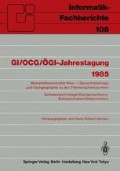Zusammenfassung
Als „Expertensysteme“ werden Programmsysteme bezeichnet, die über das Wissen von Experten in einem bestimmten (abgegrenzten) Problembereich verfügen und fähig sind, dieses Wissen zur Lösung von Problemen anzuwenden. Damit wird eine einem Experten dieses Fachgebietes vergleichbare Performanz erzielt. Die Güte eines Expertensystems hängt somit entscheidend von Qualität und Umfang des im System repräsentierten Expertenwissen ab, womit nicht nur das reine Faktenwissen gemeint ist, sondern auch die Problemlösungsheuristiken des Experten, seine „Faustregeln“, die er durch jahrelange Erfahrung gewonnen hat.
Access this chapter
Tax calculation will be finalised at checkout
Purchases are for personal use only
Preview
Unable to display preview. Download preview PDF.
Literatur
Davis R., Lenat D. B.: Knowledge-Based Systems in Artificial Intelligence, McGraw-Hill, New York, 1982.
Feigenbaum E. A.: The Art of Artificial Intelligence: Themes and Case Studies of Knowledge Engineering, in Michie D. (ed.), Expert Systems in the Micro Electronic Age, Edinburgh Univ.Press, Edinburgh, 1977.
Harmon P., King D.: Expert Systems, Wiley, New York, 1985.
Hayes-Roth F., Waterman D., Lenat D. (eds.): Building Expert Systems, Addison-Wesley, Reading, Mass., 1982.
Lenat D. B.: The Role of Heuristics in Learning by Discovery: Three Case Studies, in Michalski R.S., et al. (eds.), Machine Learning: An Artificial Intelligence Approach, Tioga, Palo Alto, Calif., 1982.
Michie D.: Inductive Rule Generation in the Context of the Fifth Generation, in Michalski R. S. (ed.), Proceedings of the International Machine Learning Workshop, Department of Computer Science, University of Illinois at Urbana-Champaign, 1983.
Widmer G., Horn W.: VIE-PCX — The Vienna PC Expert System, Bericht 84-04, Institut für Medizinische Kybernetik und AI, Universität Wien, 1984.
Widmer G., Horn W.: VIE-PCX — Ein Expert System Shell für den PC, in: Proceedings der österreichischen Artificial Intelligence Tagung 1985, Springer, Berlin, 1985.
Author information
Authors and Affiliations
Editor information
Editors and Affiliations
Rights and permissions
Copyright information
© 1985 Springer-Verlag Berlin Heidelberg
About this paper
Cite this paper
Horn, W. (1985). Knowledge Engineering: Werkzeuge zum Erstellen von Expertensystemen. In: Hansen, H.R. (eds) GI/OCG/ÖGI-Jahrestagung 1985. Informatik Fachberichte, vol 108. Springer, Berlin, Heidelberg. https://doi.org/10.1007/978-3-642-70639-4_6
Download citation
DOI: https://doi.org/10.1007/978-3-642-70639-4_6
Publisher Name: Springer, Berlin, Heidelberg
Print ISBN: 978-3-540-15697-0
Online ISBN: 978-3-642-70639-4
eBook Packages: Springer Book Archive

